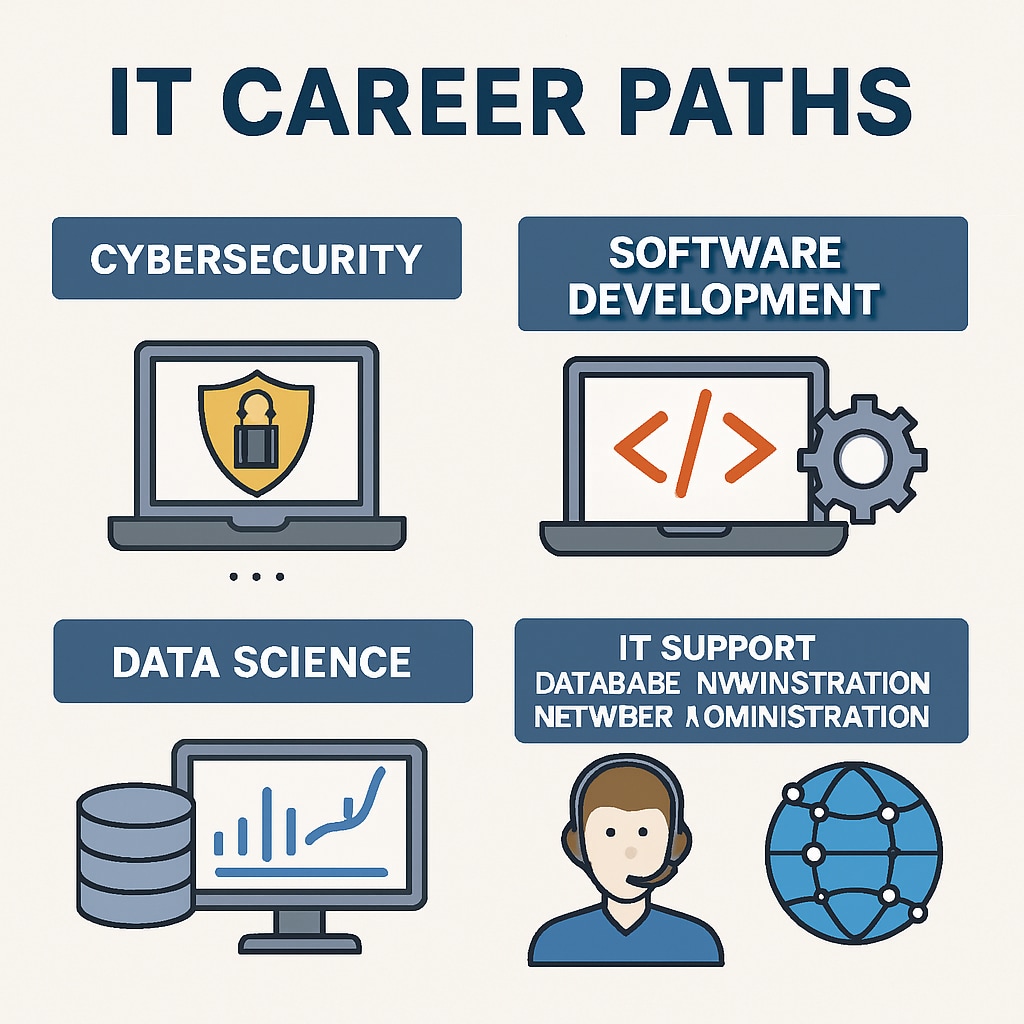Choosing a career in the IT industry can be daunting for university freshmen, especially when facing the vast range of opportunities within this dynamic field. From cybersecurity to software development, the choices are both exciting and overwhelming. This guide will explore five key areas to help 18-year-old IT students navigate their career choices, build confidence, and lay the groundwork for a successful professional journey.
Understanding the IT Landscape
Before diving into specific career paths, it’s essential to understand the broad IT landscape. Information technology encompasses various roles, from technical to managerial. For example, you might focus on creating software, securing systems, or analyzing data. The industry constantly evolves, requiring professionals to stay updated on trends and technologies. Familiarizing yourself with the basics of IT will help you identify where your interests align.
Begin by exploring foundational concepts such as programming languages, databases, and networking. Many resources, like programming guides on Wikipedia, offer excellent starting points for beginners. Understanding these basics will aid you in deciding which specialization suits you best.

Five Prominent IT Career Paths
Let’s examine five popular IT career paths that offer distinct opportunities and challenges:
- Cybersecurity: As cyber threats increase, the demand for skilled cybersecurity professionals has skyrocketed. This field involves protecting networks, systems, and data from attacks. If you have a passion for problem-solving and a meticulous approach, cybersecurity could be your calling.
- Software Development: Developers create applications, websites, and software solutions. This career is ideal for those who enjoy coding and designing innovative digital tools.
- Data Science: Data scientists analyze large datasets to derive meaningful insights. This role combines statistics, machine learning, and programming, making it perfect for students with a knack for numbers.
- Network Administration: Network administrators ensure that an organization’s communication systems run smoothly. If you’re interested in managing infrastructure and solving connectivity issues, this path is worth exploring.
- Artificial Intelligence (AI) and Machine Learning (ML): AI and ML specialists develop intelligent systems capable of learning and decision-making. This cutting-edge field requires creativity and a strong understanding of algorithms.
By exploring these areas, you can identify which aligns with your interests and strengths. For example, if you enjoy creative problem-solving, software development or AI might appeal to you. On the other hand, if you prefer securing systems and protecting data, cybersecurity could be your fit.

Building a Strong Foundation
Once you’ve identified a potential career path, it’s time to build a solid foundation. Here are some steps to consider:
- Take Relevant Courses: Enroll in classes that align with your chosen field. For example, take programming courses for software development or data analysis classes for data science.
- Engage in Projects: Practical experience is invaluable. Work on personal or group projects to enhance your skills and demonstrate your capabilities to potential employers.
- Join Student Organizations: Many universities have IT clubs where you can network, collaborate, and participate in tech-related events.
- Earn Certifications: Certifications such as CompTIA Security+ for cybersecurity or AWS Certified Solutions Architect for cloud computing can boost your resume.
These steps not only build your technical expertise but also develop soft skills like teamwork, problem-solving, and communication, which are crucial in the IT industry.
Staying Adaptable in a Dynamic Industry
The IT sector is constantly changing, with new technologies emerging regularly. To remain competitive, it’s vital to stay adaptable. Here’s how:
- Keep Learning: Stay updated on industry trends by following IT blogs, attending webinars, and taking online courses.
- Seek Mentorship: Connect with experienced professionals who can offer guidance and share their experiences.
- Experiment with New Tools: Don’t be afraid to explore emerging technologies like blockchain or augmented reality to broaden your expertise.
By staying curious and adaptable, you’ll position yourself for long-term success in this ever-evolving field.
Crafting Your IT Career Plan
Finally, create a clear career plan. Define short-term goals, such as learning a new programming language, and long-term objectives, such as becoming a lead developer or IT manager. Regularly review your progress and adjust your plan as needed.
Remember, your university years are the perfect time to experiment, learn, and grow. By taking proactive steps and exploring different opportunities, you’ll set yourself on a path to a rewarding IT career.
In conclusion, navigating the vast IT industry requires curiosity, determination, and adaptability. By exploring different career paths and building a strong foundation, university freshmen can find their niche and embark on a fulfilling professional journey.


